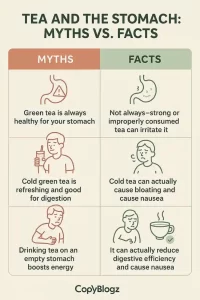
Is Green Tea Hard on Stomach? Myths, Side Effects & Safe Tips
- April 14, 2025
- by
- Shanaya
Curious if green tea is harsh on stomach? Although green tea has been famous for its health benefits, bloating, cramps, or nausea might happen after drinking it. Let’s take a look at what science says about how green tea affects your stomach and digestive health.
With spring in full swing, here’s how green tea can support your wellness without stomach woes.
Green tea, in moderation, may help improve heart health and memory, aid in weight loss, and combat certain cancers. I already shared its amazing health benefits in previous blog here.
Highlights:
- Improve heart health
- Improve memory
- Protect against tooth decay
- Aid in weight loss
- Combat cancer & leukemia
- Manage diabetes
- Treat bad breath (Trusted Source)
Is Green Tea Hard on Stomach?
Green Tea and Digestion: Side Effects
There are several reasons why green tea might cause digestive issues. Let’s break down the main impacts and how green tea digestion problems occur.
1. Drinking Green Tea Too Hot or Too Cold
- Extremely hot or cold tea can irritate the stomach lining.
- This can result in green tea bloating, indigestion, or pain in the abdomen.
2. Strong Green Tea and Tannins
Strongly brewed green tea contains high levels of tannins, which can induce:
- A bitter flavor.
- Bloating and discomfort.
- Inflammation of digestive tissues, which can lead to stomach aches.
- Sensitivity is different from individual to individual. (Trusted Source)
3. High Caffeine Content
Green tea has caffeine, which can:
- Stimulate the GI tract.
- Make stomach upset or even diarrhea in sensitive people.
How Green Tea Bloating Hurts Stomach
4. Consuming Green Tea on Empty Stomach
- Possibly raise stomach acidity.
- Can cause green tea bloating, nausea, or digestive issues.
5. Excessive Green Tea Consumption
Consuming too much green tea may:
- Worsen acid reflux
- Raise acidity and stomach discomfort
6. Taking Green Tea Right Before or After Meals
Tea leaves are acidic and can interfere with digestion:
- Before meals: Acid can stiffen food proteins, making them more difficult to digest
- After meals: Tannins can inhibit iron absorption and cause abdominal pain
🧠 Green Tea & Stomach Side Effects – Quick Recap
- Sipping too hot or concentrated, or with an empty stomach can lead to green tea bloating.
- Acidity, caffeine, and tannins could cause bloating, stomach discomfort, or acid reflux—particularly if taken excessively or close to meals.
Quick Answer: Is Green Tea Hard on Stomach?
It can — if you drink it too concentrated or hot, or on an empty stomach. Individuals with ulcers, acid reflux, or sensitivity to caffeine need more caution. If taken properly, green tea actually facilitates digestion and general health.
You might also like: Health benefits of kombucha tea
Best Time to Drink Green Tea
1. During Exercise
There are some studies that show drinking green tea may especially benefits prior to exercise.
A trial in 13 females showed that drinking 3 cups of green tea the previous day and an additional cup 2 hours before exercise increased fat oxidation during exercise.
A further study in 12 males showed that pre-exercise ingestion of green tea extract increased fat oxidation by 17% compared with a placebo. (TrustedSource)
2. In the Morning
Brain-alerting effects are due in part to the presence in green tea of caffeine, which is a stimulant proven to enhance attention and alertness. (TrustedSource)
Green tea also contains L-theanine, an amino acid that has calming effects.
Combining L-theanine and caffeine promote brain function and mood — without the aftereffects commonly associated with caffeine.
Overall, green tea has both caffeine and L-theanine that can both increase attention and alertness, which is particularly great in the morning. Furthermore, consuming this tea prior to exercise can enhance fat burning and minimize muscle damage.
3. One to two hours after meals to avoid green tea bloating
For some people, best time to enjoy the drink is one to two hours after meals. This can help minimize the risk of gastrointestinal distress and interferes with nutrient absorption.
Quick Recap – What is best time to drink green tea?
- Green tea possibly hurt your stomach if it’s too strong or hot, or sipping on an empty stomach.
- For best results, drink it in the morning, before exercise, or 1–2 hours after meals.
Who Needs to Take Precaution with Green Tea Digestion
These particular individuals must abstain from or restrict green tea intake.
1. Stomach Problems, Caffeine Sensitive
- In most cases, people with stomach problems, including stomach ulcers or acid reflux, may take green tea in moderate amounts. It is nonetheless recommended to be careful of side effects and vary intake accordingly.
- The green tea’s caffeine will cause insomnia, anxiety, irritability, nausea, or stomach upset if consumed in excessive amounts.
2. Iron Deficiency or Anemia and Bleeding Disorders
- Excessive consumption of tea can cause iron deficiency as tea contains a lot of tannins, which can combine with iron and inhibit its absorption in the gut.
- Many people enjoy a warm cup of tea after meals to help digest their food. Green tea can have the opposite effect if taken immediately following an iron-containing meal, though. Therefore, you should take green tea at least 1 hour post meals.
- In exceptional instances, green tea may result in bleeding disorders. Green tea’s compounds lower fibrinogen levels, an integral blood clotting protein. Fatty acid oxidation is also inhibited by green tea, causing the blood to thin.
3. Pregnant and Nursing Women
- If you are pregnant or lactating, having green tea in moderation—approximately 2 cups a day—is safe. This gives you about 200 mg of caffeine. Drinking more than two cups a day, however, can enhance the risk of miscarriage and other adverse effects. Moreover, overconsumption by pregnant women can enhance the risk of birth defects in newborns.
- Caffeine is able to pass through breast milk and impact the baby. Excessive consumption of caffeine during breast-feeding may produce sleep disturbances, irritability, and elevated bowel movement in breastfed infants. If you are breast-feeding, it is advisable that you consume no more than 200mg daily or best to consult your healthcare professional.
4. Issues related to Heart, Liver, High Blood Pressure, Diabetes
- Though tea drinking could lower the risk of coronary heart disease and other cardiovascular conditions like stroke, angina, heart attack, and cardiac arrest; individuals with cardiovascular conditions should be careful.
- Excessive drinking of strong tea can increase blood pressure in individuals with high blood pressure.
- Supplements of green tea extract have been associated with a few instances of liver injury. The extracts make liver disease worse if high doses are taken. In advanced liver disease, caffeine accumulates in the blood and is metabolized more slowly, taxing the liver.
- The green tea caffeine may influence blood glucose control.
5. Individuals who have Irritable Bowel Syndrome (IBS) or Diarrhea
- The caffeine from green tea, particularly when consumed in large quantities, is known to exacerbate diarrhea and IBS symptoms.
- The caffeine is a laxative since it activates the colon to contract more often. This produces more frequent bowel movements and can upset the stomach.
Summary:
Individuals with stomach problems, iron deficiency anemia, pregnancy, liver or heart conditions, hypertension, or IBS are advised to moderate green tea consumption. Excessive caffeine or tannin may exacerbate conditions or affect drugs—moderate and timing is essential.
You might also like: Top 5 natural herbs support your liver and kidney
Tea and the Stomach: Myths vs. Facts About Green Tea and Digestion
You might also like: Top herbal tea for heart health
Enjoying Green Tea Without Stomach Problems
Green tea Bloating Solutions
1. Take warm tea (Brew Appropriately)
Use water between 160 and 180°F (70 and 80°C) to brew the green tea. Do not boil the tea excessively for a long time.
2. Take it between meals
Do not drink tea on an empty stomach, or immediately after meals.
3. Moderate Your Consumption
Limit your intake of green tea, particularly if you are caffeine or tannin sensitive, or if you have other medical issues.
4. Choose Decaffeinated Alternatives
If you are caffeine sensitive, use decaffeinated green tea.
5. Look for alternatives
If you experience uneasiness after drinking a particular variety of tea, you might think of switching to another one or quitting completely. This might indicate that the tea is no longer compatible with your body, and drinking it will only put extra pressure on your digestive system.
6. Drink less fresh picked tea (freshly released tea)
Fresh tea can easily cause stomach irritation. So, it ought to be preserved for roughly ten days before drinking it. Once ten days have passed, it can be steeped. While making fresh tea, use a moderate quantity of leaves and attempt to select a lighter variety of tea.

How to Drink Green Tea without Bloating
Quick tip: Drink green tea 1-2 hours post-meals to prevent bloating!
Did you find these tips helpful? Share them with a tea lover!
You might also like: Holy Basil Benefits for Blood Sugar Control
Best Teas for Sensitive Stomachs: Green Tea and Herbal Options
Wishing to indulge in tea without stomach discomfort? The secret is selecting soothing choices.
Here are some of the best green tea combinations and herbal teas that promote digestion and soothe irritation.
| Tea Type | Description | Tips |
|---|---|---|
| Fresh Green Tea | High-grade young leaves, rich in antioxidants and anti-inflammatory agents. Gentle and energizing, great for delicate stomachs. |
|
| Ginger Green Tea | Contains warming and anti-inflammatory ginger. Helps digestion and colds. |
|
| Peppermint Green Tea | Peppermint soothes digestion; green tea provides antioxidants. Beneficial for most but not all. |
|
| Licorice Green Tea | Eases cramps and digestive discomfort. Licorice root combines with green tea for soothing effects. |
|
| Chamomile Green Tea | Chamomile’s anti-inflammatory properties combined with green tea alleviate acid reflux and tension. |
|
| Holy Basil (Tulsi) Tea | Relieves stress and inflammation; gentle on digestion when paired with green tea. |
|
| Lotus Green Tea | Anti-inflammatory and calming. Mild for acid reflux relief. |
|
| Rice Green Tea (Genmaicha) | Blends roasted rice with green tea for a smooth, stomach-friendly flavor. |
|
⚠️Sensitive Stomach Must-Knows
- Balance is key: Restrict to 1–2 cups per day.
- Start low: Have 4–6 oz and note how the stomach reacts.
- Drink with food: Preferably 1–2 hours after a meal.
- Use the herbal-only options if caffeine/tannins are an issue: (Ginger, lotus, licorice, tulsi, and chamomile are all caffeine-free and stomach-friendly)
- Consult your doctor: Especially if you have ulcers, reflux, allergies, or take medication—these teas may interact or exacerbate symptoms
🍵 Final Thoughts: Is Green Tea Hard on Stomach? Safe Tips
Although green tea is full of health benefits, it’s not always easy on every stomach—particularly when taken in excess, on an empty stomach, or brewed too concentrated.
The solution is careful consumption: drink it warm (not hot), don’t have it right before or after meals, and pay attention to how your body responds.
✅ Want to have the benefits without green tea bloating? Keep it to 1–2 cups a day. Have it with food if you’re sensitive, and try milder options if necessary.
👉 Learn more on green tea’s health benefits in our Amazing Benefits of Green Tea article.
By learning how green tea works on your digestive health, you can benefit from it with less side effects. Let us know your best tea secret in the comments below!
Conclusion
Finding the question, “Is green tea hard on stomach? Myths, truth, side effects and safe tips,” unfolds green tea to be a palatable digestive beverage when taken properly.
Despite myths that claim it is always pleasant or troublesome for everyone, in reality, lies moderation and proper preparation.
Strong brews, hollow stomachs, or excessive imbibing may be unpleasant, but astute planning—like brewing 160-180°F, consuming 1-2 cups after meal, or consuming soothing blends like lotus, chamomile, or rice green tea—may render it stomach-friendly.
In sensitive stomachs, decaf herbal teas like ginger or lotus flower provide gentler consolation.
Always try it out first in small amounts and consult with a doctor if you have ulcers or acid reflux, or any other medical conditions. With these safe guidelines, green tea will be able to boost your well-being without a problem.
You may also like:
Home remedies for period pain | How to make kombucha tea at home | Gelatin health benefits
FAQs – Green Tea Digestion and Gentle Options
Will green tea cause gastritis?
Yes, green tea can cause gastritis in some individuals—especially when consumed on an empty stomach or in strong concentrations. Green tea tannins activate stomach acid, which irritates the stomach lining and worsens symptoms like nausea, bloating, or cramping. Those with pre-existing gastritis or ulcers should consume green tea cautiously and avoid high-strength brews.
Is it OK to drink green tea before sleep?
It depends on your caffeine sensitivity. Green tea contains low to moderate caffeine, which can disrupt sleep in sensitive individuals. You can opt for caffeine-free or low-caffeine herbal blends like chamomile or tulsi tea for nighttime.
What green tea is easiest on the stomach?
The easiest on the stomach are low-caffeine, light-brewed, or mixed green teas, including:
- Young leaf green tea—sensitive and low in tannins
- Ginger green tea—warming and relaxing for digestion
- Chamomile green tea—anti-inflammatory and relaxing
- Rice tea (Genmaicha)—mild and starchy, very stomach-accommodating
Does green tea interact with medicines?
It may interact with some drugs, such as blood thinners, some antidepressants, and blood pressure drugs. You should talk to a health professional if you are on medication and contemplating regular consumption of green tea.










